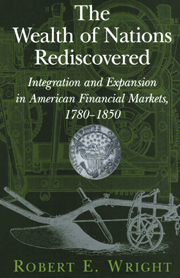 The Wealth of Nations Rediscovered
The Wealth of Nations Rediscovered Book contents
- Frontmatter
- Contents
- List of Tables
- Acknowledgments
- List of Abbreviations
- The Wealth of Nations Rediscovered
- 1 Introduction: The Wealth of Nations and National Wealth
- 2 The International and Colonial Background of America's Financial Revolution
- 3 Banks, Securities Markets, and the Reduction of Asymmetric Information
- 4 The Financial Sector and the Reduction of Lending-Related Costs and Risks
- 5 Evidence of Capital Market Integration, 1800–1850
- 6 Expansion of the Securities Services Sector, 1790–1850
- 7 The Freest of the Free: Regulation of the Financial Sector
- 8 Finance-Directed Economic Development
- 9 Conclusion
- References
- Index
3 - Banks, Securities Markets, and the Reduction of Asymmetric Information
Published online by Cambridge University Press: 16 January 2010
- Frontmatter
- Contents
- List of Tables
- Acknowledgments
- List of Abbreviations
- The Wealth of Nations Rediscovered
- 1 Introduction: The Wealth of Nations and National Wealth
- 2 The International and Colonial Background of America's Financial Revolution
- 3 Banks, Securities Markets, and the Reduction of Asymmetric Information
- 4 The Financial Sector and the Reduction of Lending-Related Costs and Risks
- 5 Evidence of Capital Market Integration, 1800–1850
- 6 Expansion of the Securities Services Sector, 1790–1850
- 7 The Freest of the Free: Regulation of the Financial Sector
- 8 Finance-Directed Economic Development
- 9 Conclusion
- References
- Index
Summary
Economists, historians, all thinking beings really, rely on theories to help them to make sense of a complex world. Economists tend to be very explicit about their theories, historians much less so. Historians often embed their theories in a narrative structure. Indeed, some historians deny that they use theories at all. Only the most naive epistemology would support such a view, however. Indeed, even early Americans employed theories to help them to understand reality. In 1789, for example, New Yorker George Thatcher correctly predicted, based “more upon theory than facts,” that Continental securities would appreciate faster than “the securities of those States that have not certain funds for their redemption.” Similarly, one critic of the War of 1812 used “the theory of loans” to predict interest rate increases.
The question, therefore, is not whether a scholar employs theory, but whether the theory is explicit or implicit. An important theory underlying this study, the theory of information asymmetry, is here made quite explicit. Indeed, the point of this chapter is to explain and explore that theory, which is particularly amenable to economic and business historians but is straightforward enough for general historians to follow.
The theory of asymmetric information posits that differential access to relevant, private information creates market inefficiencies by interfering with the creation or fulfillment of business contracts. The theory makes one major, but highly plausible, assumption: parties to the contract with superior information will attempt to take advantage of parties with inferior information.
- Type
- Chapter
- Information
- The Wealth of Nations RediscoveredIntegration and Expansion in American Financial Markets, 1780–1850, pp. 26 - 42Publisher: Cambridge University PressPrint publication year: 2002


